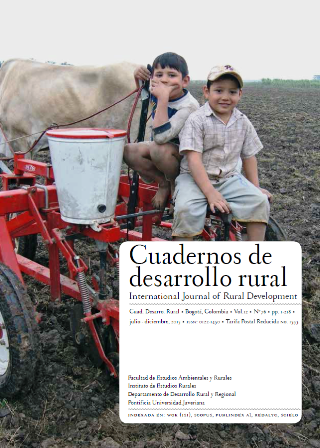Abstract
Rural Territorial Development policy approach was launched in Europe to foster rural development under the LEADER initiative. It sparked off great interest in Latin America. We analyse the role played by RTD principles in the dynamics and evolution of four rural areas in Spain and Nicaragua. In doing so, we provide
empirical understanding on the validity of the principles to boost rural change and contribute to evidencebased policy-making.
Methodologically, we explore the use of participatory prospective tools that apprehend rural areas’ evolving and complex nature. The potential of Prospective Structural Analysis to describe rural dynamics, and to support social changes and decision-making is tested.
Cuadernos de Desarrollo Ruralis registered under a Creative Commons Attribution 4.0 International Public License. Thus, this work may be reproduced, distributed, and publicly shared in digital format, as long as the names of the authors and Pontificia Universidad Javeriana are acknowledged. Others are allowed to quote, adapt, transform, auto-archive, republish, and create based on this material, for any purpose (even commercial ones), provided the authorship is duly acknowledged, a link to the original work is provided, and it is specified if changes have been made. Pontificia Universidad Javeriana does not hold the rights of published works and the authors are solely responsible for the contents of their works; they keep the moral, intellectual, privacy, and publicity rights.
Approving the intervention of the work (review, copy-editing, translation, layout) and the following outreach, are granted through an use license and not through an assignment of rights. This means the journal and Pontificia Universidad Javeriana cannot be held responsible for any ethical malpractice by the authors. As a consequence of the protection granted by the use license, the journal is not required to publish recantations or modify information already published, unless the errata stems from the editorial management process. Publishing contents in this journal does not generate royalties for contributors.


